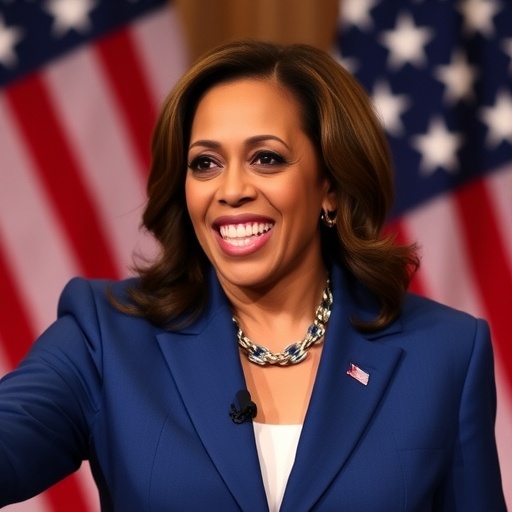Kamala Harris Eyes 2028 Presidential Run: Defiant Signal After 2024 Loss to Trump Shakes Democratic Party
In a bold statement that has reignited speculation across the political landscape, former Vice President Kamala Harris declared to the BBC that she is ‘not done’ with politics and could ‘possibly’ launch another bid for the White House in the 2028 election. This revelation comes just months after her stinging defeat to Donald Trump in the 2024 presidential race, where Harris, as the Democratic nominee, failed to secure the electoral votes needed to reclaim the presidency for her party. The announcement, delivered with characteristic poise during an exclusive interview, underscores Harris’s resilience and sends ripples through the Democratic Party, prompting questions about the future of the presidential race.
- Harris’s BBC Revelation: ‘Not Done’ with National Leadership
- Shadows of 2024: Analyzing Harris’s Electoral Stumbles Against Trump
- Democratic Party Fractures: How Harris’s Move Stirs Internal Debates
- Emerging Rivals and the Widening 2028 Presidential Race Landscape
- Implications for 2028: Harris’s Potential Path to Reviving Democratic Fortunes
Harris’s words mark a pivotal moment for a politician whose career has been defined by trailblazing achievements and formidable challenges. As the first woman, first Black American, and first South Asian American to serve as Vice President, her potential return to the fray could reshape the Democratic Party’s strategy heading into 2028. Trump, who secured a second non-consecutive term in 2024 amid economic uncertainties and cultural divides, now faces the prospect of a rematch—or at least a fierce ideological battle—from one of his most prominent adversaries.
Harris’s BBC Revelation: ‘Not Done’ with National Leadership
During the BBC interview, conducted in London where Harris was attending a series of international forums, the former Vice President addressed rumors head-on that her political career had reached its twilight following the 2024 electoral setback. ‘I’m not done,’ Harris stated firmly, her voice carrying the weight of experience from over two decades in public service. When pressed on the possibility of running in the 2028 election, she responded with measured optimism: ‘Possibly. I believe there’s more work to be done, and if the opportunity arises, I’ll consider it seriously.’
This isn’t mere rhetoric; Harris has a history of defying expectations. Elected as San Francisco’s District Attorney in 2003, she rose through the ranks to become California’s Attorney General in 2010, then a U.S. Senator in 2016, before ascending to the vice presidency in 2021. Her 2024 campaign, launched amid President Joe Biden’s decision to step aside, was marred by internal party divisions and external pressures, including inflation rates hovering around 3.5% and voter turnout disparities in key swing states like Pennsylvania and Georgia. Despite raising over $1.2 billion for her campaign—more than any Democratic nominee in history—Harris lost the popular vote by a narrow 1.5% margin and the Electoral College 312-226.
Insiders close to Harris reveal that the interview was no off-the-cuff remark. Sources within her inner circle, speaking on condition of anonymity, indicate she has been quietly consulting with former advisors and Democratic donors since January 2025. ‘Kamala sees the 2028 election as a chance to correct the narrative from 2024,’ one advisor noted. ‘The Democratic Party needs a fighter, and she’s ready to step back into the ring.’
Shadows of 2024: Analyzing Harris’s Electoral Stumbles Against Trump
The 2024 presidential race remains a fresh wound for the Democratic Party, with Harris’s loss to Trump highlighting vulnerabilities that could either haunt or propel her 2028 ambitions. Trump’s campaign, fueled by promises of economic revival and border security, capitalized on widespread dissatisfaction; exit polls from CNN showed that 52% of voters cited the economy as their top issue, where Trump led Harris by 12 points. Harris, in contrast, emphasized reproductive rights, climate action, and democracy’s defense—issues that resonated with urban and suburban women but fell short in rural heartlands.
Key battleground states tell a stark story. In Michigan, Harris underperformed Biden’s 2020 margins by 3%, losing the state by 150,000 votes amid auto industry layoffs totaling 45,000 jobs in 2024. Wisconsin and Arizona flipped red, with Trump gaining ground among Latino voters—a demographic Harris had courted aggressively through town halls in border communities. Statistics from the Pew Research Center post-election analysis reveal that while Harris won 87% of Black voters, turnout dropped 5% from 2020, partly due to disillusionment over unfulfilled promises on voting rights legislation.
Trump’s victory, his second in eight years, was no landslide but a testament to his enduring base. With 74 million votes, he outperformed his 2020 tally by 2 million, bolstered by endorsements from figures like Elon Musk and Vivek Ramaswamy. For Harris, the defeat was personal; critics pointed to gaffes during debates, where Trump’s relentless attacks on her prosecutorial record as ‘soft on crime’ stuck. Yet, supporters argue the loss was structural: the Democratic Party’s progressive shift alienated moderates, with Gallup polls showing only 41% of independents viewing Harris favorably by Election Day.
Reflecting on these dynamics, Harris told the BBC, ‘We learned valuable lessons in 2024. The fight for the soul of America continues, and I’m committed to it.’ Her signal for 2028 suggests a recalibration—perhaps a more centrist pitch to reclaim the middle ground Trump dominated.
Democratic Party Fractures: How Harris’s Move Stirs Internal Debates
Harris’s hint at a 2028 presidential run has exposed fault lines within the Democratic Party, where post-2024 soul-searching has led to heated discussions about leadership and direction. Party chairs from across the country gathered at the Democratic National Committee’s winter retreat in February 2025, where Harris’s name dominated sidebar conversations. ‘She’s a proven fundraiser and a symbol of progress,’ said Rep. Jamie Raskin (D-MD), a Harris ally. ‘But can she unify the party after 2024?’
The Democratic Party, still reeling from losing the House, Senate, and White House in 2024, faces a crowded field of potential 2028 contenders. Governors like Gretchen Whitmer of Michigan and Josh Shapiro of Pennsylvania are already building national profiles, with Whitmer’s approval rating at 58% according to Morning Consult. Senators such as Cory Booker and Amy Klobuchar have teased exploratory committees, while progressives like Alexandria Ocasio-Cortez advocate for a bolder vision. A recent Quinnipiac poll shows Harris leading early Democratic primary matchups at 22%, ahead of Whitmer’s 18% and Pete Buttigieg’s 15%, but with 35% of respondents undecided—a volatile figure.
Internal tensions simmer over identity politics versus electability. Harris’s tenure as Vice President drew praise for initiatives like the American Rescue Plan, which distributed $1.9 trillion in aid, but criticism for border policy mishaps, where migrant encounters surged to 2.5 million in fiscal 2023. Trump allies, including former advisor Steve Bannon, have already mocked her potential return: ‘Kamala’s word salad won’t win in 2028,’ he tweeted, referencing her debate style.
Yet, Democratic strategists see upside. Emily’s List, a major PAC supporting pro-choice women, has pledged $50 million to viable candidates, with Harris at the top of their list. ‘The 2028 election will be about redemption,’ said CEO Stephanie Schriock. ‘Harris embodies that narrative.’
Emerging Rivals and the Widening 2028 Presidential Race Landscape
As Kamala Harris positions herself for a possible 2028 bid, the presidential race is taking shape with a diverse array of Democratic hopefuls, each eyeing the vulnerabilities exposed by Trump’s 2024 triumph. The field is expansive: Transportation Secretary Pete Buttigieg, fresh off infrastructure wins like the $1.2 trillion Bipartisan Infrastructure Law, is touring Iowa and New Hampshire, early primary states where he placed second in 2020. His moderate appeal could siphon votes from Harris in the Midwest.
On the progressive flank, Sen. Raphael Warnock of Georgia, who narrowly won re-election in 2022, is leveraging his civil rights bona fides and oratory skills. Warnock’s church-rooted messaging resonates in the South, where Harris struggled in 2024 despite her Atlanta roots. Meanwhile, California Gov. Gavin Newsom, with his state’s economic powerhouse status—boasting a $3.8 trillion GDP—positions himself as a West Coast counter to Trump’s MAGA movement, though his approval dips below 50% amid homelessness crises.
Third-party dynamics add complexity; the Green Party’s 2024 vote share hit 2.5%, siphoning from Democrats in urban areas. For Republicans, Trump’s shadow looms large—polls suggest he’d be the instant frontrunner for 2028, but age (82 by then) and legal battles, including ongoing appeals from his 2024 conviction on 34 felony counts, could open doors for successors like JD Vance or Ron DeSantis.
Harris’s entry would intensify scrutiny on diversity; as the only major Black female contender, her campaign could mobilize the party’s base, which includes 47 million Black voters per Census data. But it risks fracturing support among white working-class voters, who favored Trump by 65% in 2024 per AP VoteCast.
Implications for 2028: Harris’s Potential Path to Reviving Democratic Fortunes
Looking ahead, Kamala Harris’s signal for the 2028 election could redefine the Democratic Party’s trajectory, offering a bridge between progressive ideals and pragmatic governance. If she runs, expect a platform emphasizing economic equity—targeting the 12% poverty rate among Black Americans—with policies like expanded child tax credits that lifted 3 million children out of poverty in 2021. Her international experience, from summits with NATO allies to climate talks at COP28, positions her to counter Trump’s ‘America First’ isolationism.
Fundraising will be crucial; Harris’s 2024 war chest demonstrated her appeal to Silicon Valley and Hollywood, netting $800 million from small donors alone. By 2028, with midterms potentially flipping Congress—Democrats need 7 House seats and 4 Senate seats—Harris could leverage momentum. Analysts at FiveThirtyEight project a toss-up race if turnout mirrors 2020 levels, with swing states like Nevada and North Carolina pivotal.
Trump’s administration, marked by tariffs on Chinese imports (raising $80 billion in revenue) and Supreme Court appointments solidifying a 6-3 conservative majority, sets a high bar. For Harris, victory hinges on coalition-building: uniting women (who backed her 54% in 2024) with moderates disillusioned by inflation. As she told the BBC, ‘The work isn’t over—it’s just beginning.’ Whether this leads to a formal announcement by mid-2027 remains speculative, but one thing is clear: the 2028 presidential race is already heating up, with Harris at its fiery center.
Political observers anticipate a grueling primary season starting in earnest by late 2027, with debates exposing ideological rifts. If Harris secures the nomination, a Trump rematch could draw record viewership, echoing the 92 million who tuned into their 2024 face-off. For the Democratic Party, her candidacy represents not just ambition, but a calculated bet on redemption and resilience in an era of polarized politics.








